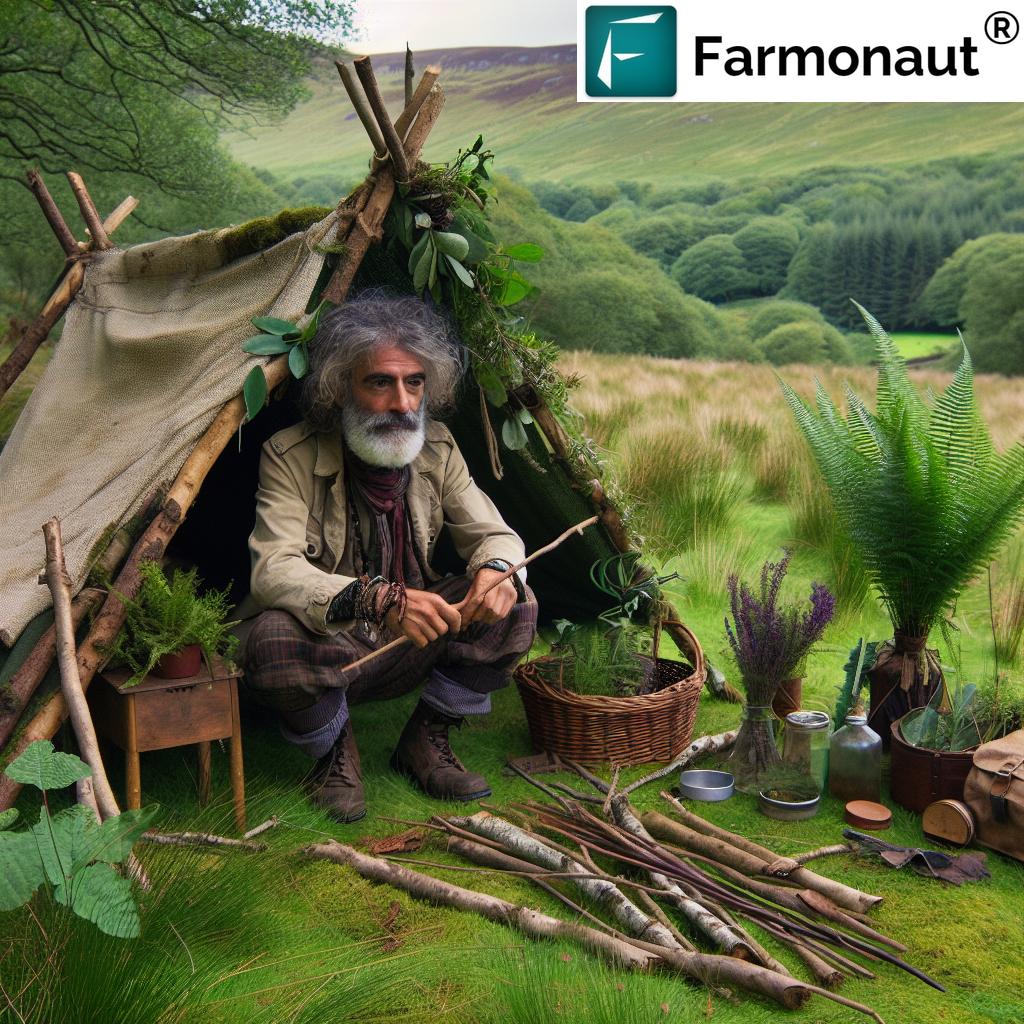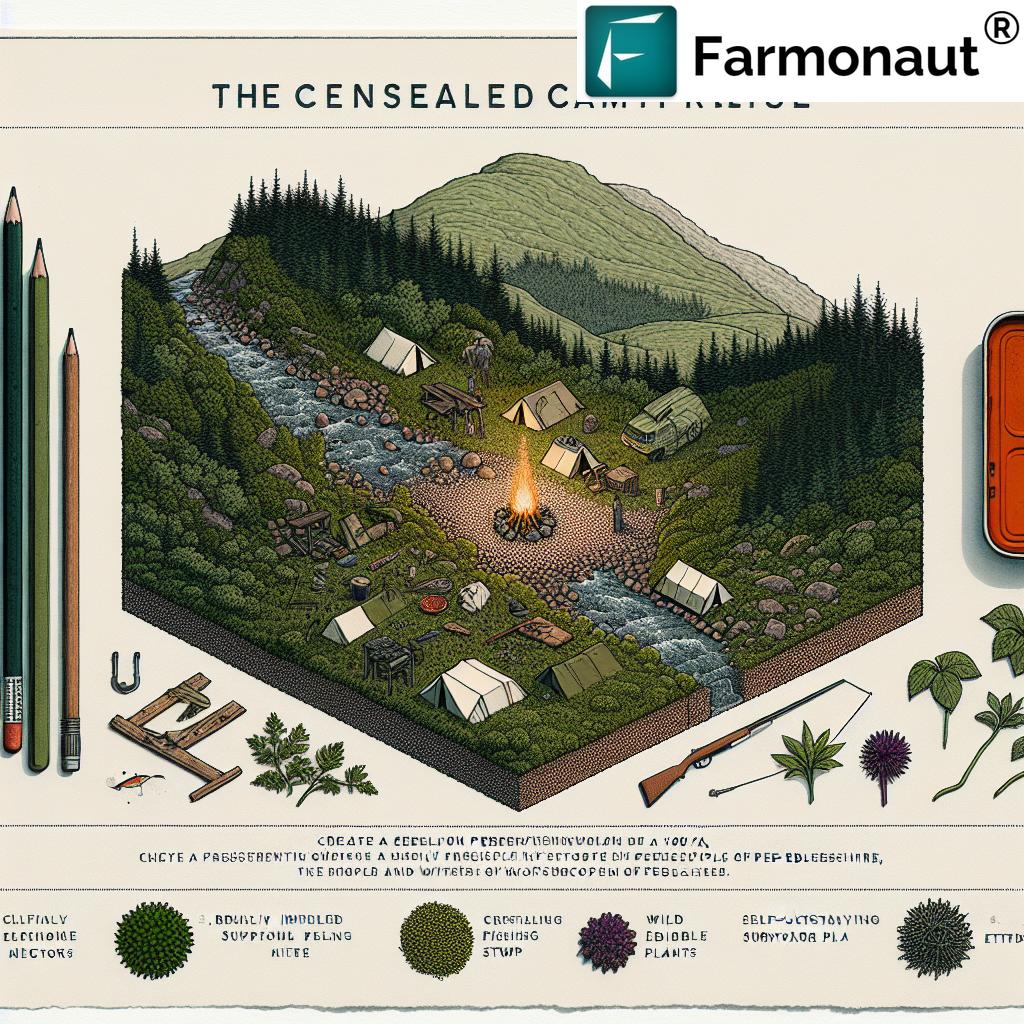Unveiling the Last Wild Campers: Survival Secrets from 1974 Peeblesshire’s Off-Grid Tramp Lifestyle
In the rolling hills of Peeblesshire, Scotland, a fascinating chapter of outdoor history unfolded in 1974. This is the story of the last wild campers, individuals who embraced the tramp lifestyle and mastered the art of off-grid camping in its purest form. Their tale is not just one of survival, but of living in harmony with nature, offering valuable lessons for modern outdoor enthusiasts and those seeking a simpler way of life.

The Lost Art of Wild Camping
The wild camping techniques of 1974 were a far cry from today’s high-tech gear and ultralight equipment. These seasoned outdoor dwellers relied on time-tested methods and an intimate knowledge of their surroundings. Their approach to outdoor survival was rooted in simplicity and resourcefulness, qualities that modern campers can still learn from today.
For those interested in exploring modern agricultural technology alongside traditional outdoor skills, the Farmonaut app offers cutting-edge tools for land management and crop monitoring.
Off-Grid Survival in Peeblesshire: A Lesson in Self-Sufficiency
Off-grid survival in Peeblesshire required a deep understanding of the local environment. These wild campers were experts in:
- Foraging for food in the Scottish countryside
- Crafting shelters from natural and salvaged materials
- Reading weather patterns without modern technology
- Navigating the rugged terrain using natural landmarks
Their rural camping techniques were not just about survival, but about thriving in nature with minimal impact on the environment. This ethos of sustainability is something that resonates strongly with today’s eco-conscious campers.
Traditional Tramp Lifestyle Camping: A Window to the Past
The traditional tramp lifestyle camping of 1974 Peeblesshire was characterized by a nomadic existence, where individuals moved with the seasons, carrying only what they needed. This minimalist approach to outdoor living offers valuable insights for modern campers looking to simplify their gear and deepen their connection with nature.
Key aspects of this lifestyle included:
- Traveling light with multi-purpose tools and equipment
- Adapting to different terrains and weather conditions
- Building temporary shelters using natural materials
- Developing a keen eye for safe and suitable camping spots
While we’ve come a long way in terms of camping technology, there’s much to be learned from these traditional camping methods. For those interested in modern agricultural technology, the Farmonaut Satellite API provides valuable data for land management and crop monitoring.

Minimalist Outdoor Living Secrets: Less is More
The minimalist camping approach of Peeblesshire’s last wild campers was not just about surviving with less, but thriving with less. Their minimalist outdoor living secrets included:
- Using natural materials for insulation and bedding
- Crafting cooking utensils from found objects
- Maximizing the utility of every item they carried
- Developing skills to replace material possessions
This approach to countryside living demonstrates that comfort and survival don’t always require modern conveniences. It’s a testament to human ingenuity and adaptability in the face of nature’s challenges.
Rural Foraging and Camping Skills: Living Off the Land
One of the most crucial aspects of the wild campers’ lifestyle was their mastery of rural foraging and camping skills. These individuals had an encyclopedic knowledge of edible plants, medicinal herbs, and wildlife behavior. Their ability to sustain themselves through nature-based subsistence was remarkable and included:
- Identifying and harvesting wild edibles safely
- Fishing in fast-running streams using handcrafted tools
- Setting humane traps for small game
- Preserving food without modern refrigeration
For those interested in modern farming techniques, the Farmonaut API Developer Docs offer insights into how technology can complement traditional agricultural knowledge.
The Last Wild Campers of Scotland: A Dying Breed
As we look back on the last wild campers of Scotland, we see a group of individuals who chose to live on the fringes of society, embracing a lifestyle that was already becoming rare in 1974. Their choice to live this way was driven by various factors:
- A deep love and respect for nature
- A desire for freedom from societal constraints
- The challenge of self-reliance
- A rejection of materialism and consumerism
While their lifestyle may seem extreme by today’s standards, there’s much we can learn from their approach to living simply and in harmony with the natural world.
Sustainable Off-Grid Camping Methods: Lessons for Today
The sustainable off-grid camping methods employed by Peeblesshire’s wild campers offer valuable lessons for modern outdoor enthusiasts. Their practices demonstrate how to enjoy nature while minimizing environmental impact:
- Using biodegradable materials for all aspects of camp life
- Practicing “leave no trace” principles before it was a widespread concept
- Rotating camping spots to allow nature to recover
- Using water sources responsibly and maintaining their cleanliness
These methods remind us of the importance of preserving our natural spaces for future generations to enjoy.
Embracing the Spirit of Wild Camping in the Modern World
While few of us can or would choose to live as the last wild campers of Peeblesshire did, their story offers inspiration for modern outdoor enthusiasts. We can incorporate aspects of their lifestyle into our own outdoor adventures:
- Simplifying our camping gear and focusing on essential skills
- Learning about local flora and fauna to deepen our connection with nature
- Practicing minimal impact camping techniques
- Embracing the challenges and rewards of self-reliance in the outdoors
By doing so, we not only honor the legacy of these remarkable individuals but also enrich our own outdoor experiences.
For those looking to combine traditional outdoor skills with modern technology, consider exploring the Farmonaut app:
Conclusion: The Enduring Legacy of Peeblesshire’s Wild Campers
The story of the last wild campers of 1974 Peeblesshire is more than just a historical curiosity. It’s a reminder of our capacity for adaptation, our innate connection to the natural world, and the profound simplicity that can be found in off-grid camping. As we face increasing environmental challenges and a world that often feels disconnected from nature, the lessons of these wild campers become ever more relevant.
Their legacy encourages us to reconsider our relationship with the outdoors, to seek out experiences that challenge us and connect us more deeply with the natural world. Whether we’re seasoned outdoor enthusiasts or city dwellers looking to escape the urban jungle, there’s wisdom to be found in the wild camping techniques of 1974 Peeblesshire.
As we move forward, let’s carry with us the spirit of these last wild campers – their resilience, their respect for nature, and their commitment to living simply and sustainably. In doing so, we not only honor their memory but also pave the way for a more harmonious relationship between humanity and the natural world.


